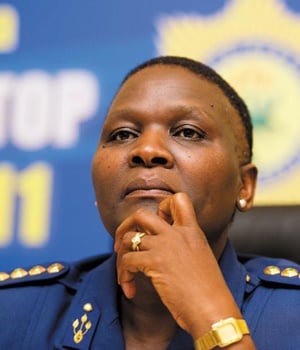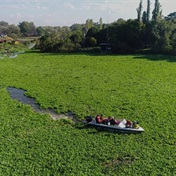
And so it ends in tears. The brief career of South Africa’s unlikeliest cop, that is.
It is now a dead certainty that National Police Commissioner Riah Phiyega will soon be on the streets, having been the highest authority to carry blame for the series of events that led to the Marikana massacre of August 2012.
Unless she jumps ship before then, she will soon appear before a presidentially appointed board of inquiry which, as many expect, will basically be an execution squad.
Like that of her predecessor, Bheki Cele, her fate was sealed long before President Jacob Zuma spoke on Thursday night. Unlike Cele, who made a stellar comeback as a powerful political figure, this former social worker and okayish corporate executive has no clout and will most likely skulk off in shame. This devout churchwoman will have to live with the cloud of having overseen post-apartheid human slaughter.
There is a strong body of opinion that the outcome of the Farlam commission of inquiry was rather unfair on her, and that she became the fall guy for a decision-making process that went much higher than her pay grade.
Those who subscribe to this body of opinion believe big political players should have been held accountable, and saw the commission’s outcome as a damp squib and a huge disappointment.
They believe that the commission should have found some culpability on the part of Phiyega’s political principals and others who set the events in motion.
But at the end of the day, they have to accept that a commission of inquiry in a law-based society can only come to conclusions that are supported by evidence.
But there can be no pity for Phiyega. In taking the job, she entered a highly politicised environment in which the top cop is not just required to catch bad guys, but cover for political principals. In her testimony before the commission, she did little to defend herself and instead dug her grave by giving what was arguably the worst testimony by a senior witness.
The commissioners described as “unsatisfactory and unconvincing” her inability to recall conversations “where political factors were inappropriately considered and discussed in relation to policing the situation at Marikana”.
“It is not clear why she wished to be evasive,” they said.
This is a question being asked by some who are close to Phiyega, who apparently advised her to let on more than she did at the commission. According to those in the know, she rebuffed several deputations from friends and associates who had knowledge of what she knew, but chose not to reveal. They hold that in addition to “protecting” higher figures during her testimony, she also wanted to create the impression that the buck stopped with her as national commissioner.
“Ubefun’ ukuzenza istarring [She wanted to be the main actor],” someone close to her said this week.
This wish to be the “star” was evident in her encouraging words to policemen after the massacre, when she praised them for “responsible policing”, much like former police minister Nathi Mthethwa, who thanked the men in blue for protecting the country from “anarchists” who wanted to turn “South Africa into a banana republic”.
The commission did not look kindly on this, chastising both of them.
So after three years of testimony, billions of words and tens of millions of rands spent, is the fall of Phiyega and possible charges against other police officers an adequate outcome? Was it worth the investment, or was it, just like the Truth and Reconciliation Commission, just another exercise in catharsis? Will it gather dust in archives and be remembered only by the victims’ families and future historians?
Well that really depends on how narrowly we wish to read the testimony, findings and recommendations in the 645-page tome. For they speak of more than just the tragic events of that August day. They tell us about a greater system failure in South Africa’s socioeconomic and political infrastructure. The report talks about a dysfunctional police operational command structure, and a force that is at sea when it comes to public order policing. It tells us of a greedy corporate sector that does not meet its legal obligations with respect to employees, thus creating tinderbox environments. We also learn about an absent-minded state that is woeful at enforcing compliance.
Judge Ian Farlam’s report also paints a picture of a union leadership that is unable and unwilling to lead. It speaks of the ingrained culture of violence, where strikes and protests are not considered real unless blood is spilt and property destroyed.
Although it does not explicitly state this, the report is a wake-up call for the political leadership that is presiding over this societal system failure.
Those who were baying for the blood of political higher-ups and were disappointed still have the option to pursue further legal routes, and some have indicated they will do so. But they should also focus their energy on fixing the system.
In the years and decades to come, we should not remember the commission for the fall of Riah Phiyega.
Its true value resides in the diagnosis of our society: Marikana was a microcosm of South Africa’s ailments.




 Publications
Publications
 Partners
Partners








